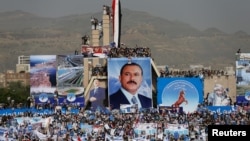The U.N. special envoy for Yemen accused the country's warring leaders on Tuesday of refusing to end the fighting and liberate the people "from the scourge of famine and conflict" because they stand to lose wealth and power.
With the civil war entering its fourth year and heavy fighting continuing, Ismail Ould Cheikh Ahmed warned that "the situation will continue worsening as well as the terrorist threat" if the parties don't listen to the people and display flexibility.
"In Yemen there are no winners on the battlefield," he told the U.N. Security Council. "The Yemeni people — they become poorer whereas the leaders become richer. ... They are not interested in finding solutions, as they will lose their power and control in a settlement."
According to John Ging, the U.N.'s director of humanitarian operations, some 15 million Yemenis lack adequate access to clean water and health services, 7 million face the threat of famine and 460,000 children are severely malnourished. Cholera has killed more than 2,100 and there are over 800,000 suspected cases, which he called the largest single-year outbreak on record.
Yemen, which is on the southern edge of the Arabian Peninsula, has been engulfed in civil war since September 2014, when Shiite Houthi rebels swept into the capital, Sanaa, and overthrew President Abed-Rabbo Mansour Hadi's internationally recognized government.
In March 2015 a Saudi-led coalition began a campaign in support of Hadi's government and against Houthi forces allied with ousted President Ali Abdullah Saleh. Since then the Iranian-backed Houthis have been dislodged from most of the south but remain in control of Sanaa and much of the north. The war has killed over 10,000 civilians and displaced 2 million people.
"The conflict is creating a desperate situation in every facet of daily life," U.N. envoy Ahmed said. "Future Yemeni generations will suffer and bear the burden of this conflict — including the massive destruction, the malnutrition, the lack of education and the economic deterioration."
Ahmed said he has been working on "a comprehensive solution" and steps to bring the parties back to the negotiating table.
He urged the Security Council "to use all of its political and economic power to exert pressure on all parties to commit to a pact of peace."
Ahmed said he will be discussing details of the proposal with Yemen's government and the alliance of the Houthis and Saleh's party. Houthi leaders have refused to meet the U.N. envoy for months.
Ahmed told reporters later that the proposal includes confidence-building measures such as bringing in cranes to increase capacity at the port of Hodeida; reopening Sanaa's airport, getting a nationwide agreement on paying salaries to civil servants, especially health and education workers; dealing with prisoners; and addressing the situation in the city of Taiz which has been under "serious embargo."
Ahmed said an end to launching missiles at Saudi Arabia must also be part of the measures, criticized recent Houthi threats to expand the firing of ballistic missiles toward other countries in the Gulf region and said negotiations offer the only way forward.
"The parties must climb out from their trenches and put an end to the hostile rhetoric," he said.
The Security Council expressed deep regret at "the lack of progress in the political process and the worsening humanitarian situation."
Members called for an immediate cease-fire and reaffirmed the need for all parties, "especially the Houthis, to engage meaningfully with the U.N. special envoy's comprehensive proposals for peace."
The council also called for "safe, rapid, unhindered and sustained humanitarian access" to all Yemenis. Ging said humanitarian workers "face unacceptable obstacles from all sides in carrying out relief efforts in Yemen."




